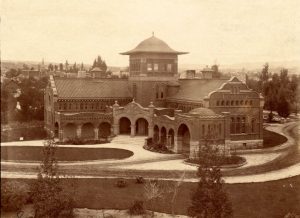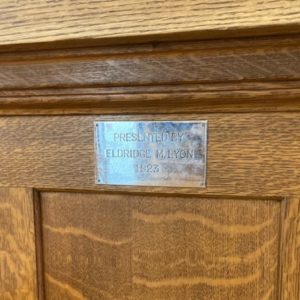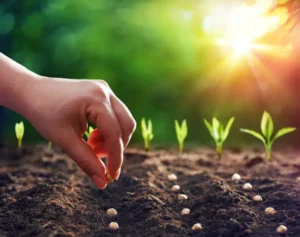 In 2025, A.K. Smiley Public Library is excited to explore the possibility of introducing a seed library to better serve our patrons and enrich the area. A seed library, at its core, is a collection of seeds that patrons can “borrow” to grow in their own gardens. The concept is simple but can be profoundly impactful, blending education, sustainability, and community engagement in a single initiative.
In 2025, A.K. Smiley Public Library is excited to explore the possibility of introducing a seed library to better serve our patrons and enrich the area. A seed library, at its core, is a collection of seeds that patrons can “borrow” to grow in their own gardens. The concept is simple but can be profoundly impactful, blending education, sustainability, and community engagement in a single initiative.
The environmental benefits of a seed library are significant. By encouraging local gardening and reducing reliance on commercially packaged seeds, which often travel long distances, we can promote sustainability. Offering seeds suitable for our region helps gardeners grow plants that thrive in the climate of Southern California while supporting pollinators and biodiversity. Additionally, a seed library opens the door to learning opportunities for all ages. Programs on gardening basics, composting, and native plants can empower our patrons to develop new skills and deepen their connection to nature. Children in particular can benefit from hands-on activities that teach them where their food comes from and the importance of caring for the environment.
Beyond environmental and educational value, a seed library can bring people together in other meaningful ways. By creating a space where gardeners – from beginner to expert – can exchange seeds, tips, and stories, the library continues to be a hub for shared knowledge and collaboration. Seed swaps, gardening clubs, and workshops in town can all stem from this initiative, fostering a sense of community that extends beyond the walls of the library.
Taking our collection in bold new directions also highlights the evolving role of public libraries – we’re not just places for books but centers for lifelong learning. A seed library perfectly aligns with our mission to provide access to both resources and information, demonstrating how libraries can adapt to the changing needs of the people we serve.
The process of using a seed library is straightforward. Patrons borrow seeds, plant them, and if possible, save seeds from their harvest to return to the library. Even those unable to save seeds can participate, as the library will maintain a stock through donations and partnerships with local organizations.
As we move forward with this idea in 2025, we’ll be seeking input and feedback from our patrons to shape our seed library to meet local needs and wants. Stay tuned for updates and opportunities to get involved as we look forward to sowing the seeds for a greener, more connected future.
~ Principal Librarian Ted Conable
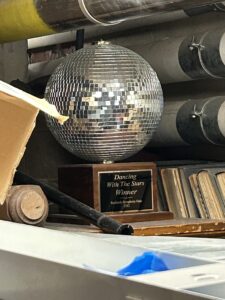 Welcome back, adventurers, to the continuation of the series where we answer that age-old question, “What’s in the basement at A.K. Smiley?” Our latest exploration into the depths of the Library has unearthed some truly fascinating artifacts that not only tell us about the past, but offer opportunities to reflect on the present.
Welcome back, adventurers, to the continuation of the series where we answer that age-old question, “What’s in the basement at A.K. Smiley?” Our latest exploration into the depths of the Library has unearthed some truly fascinating artifacts that not only tell us about the past, but offer opportunities to reflect on the present.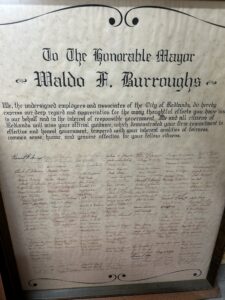 First up, we discovered a dazzling disco ball trophy with a plaque reading, “Dancing With The Stars Winner” from the Redlands Symphony Gala, 2012. This glittering prize from a night of glamor and excitement reminds us of the community spirit that pervades the City of Redlands. The 2012 Gala was a memorable affair which featured over 200 enticing options up for auction including gourmet dinners in private homes, luxury seats at a Lakers game, jewelry, wine, exotic trips to Hawaii or Italy, and one special trip to New York City which included tickets to the David Letterman show.
First up, we discovered a dazzling disco ball trophy with a plaque reading, “Dancing With The Stars Winner” from the Redlands Symphony Gala, 2012. This glittering prize from a night of glamor and excitement reminds us of the community spirit that pervades the City of Redlands. The 2012 Gala was a memorable affair which featured over 200 enticing options up for auction including gourmet dinners in private homes, luxury seats at a Lakers game, jewelry, wine, exotic trips to Hawaii or Italy, and one special trip to New York City which included tickets to the David Letterman show.
 After investigating these artifacts, we grabbed a random book: Good Housekeeping from 1915 which had a section titled ‘Your Daughter’s Career’ that extolled the benefits of education for young women. One standout quote reads: “Any woman who is going into newspaper work should know how to write. General education, culture, the larger the background of that kind one has the better, I think, in newspaper work, as in all other work. Personally, I am much in favor of the college education. I am not a college woman myself, so my favoritism can’t be prejudice.” This echoes the timeless value of a well-rounded education and the importance of embracing diverse perspectives.
After investigating these artifacts, we grabbed a random book: Good Housekeeping from 1915 which had a section titled ‘Your Daughter’s Career’ that extolled the benefits of education for young women. One standout quote reads: “Any woman who is going into newspaper work should know how to write. General education, culture, the larger the background of that kind one has the better, I think, in newspaper work, as in all other work. Personally, I am much in favor of the college education. I am not a college woman myself, so my favoritism can’t be prejudice.” This echoes the timeless value of a well-rounded education and the importance of embracing diverse perspectives.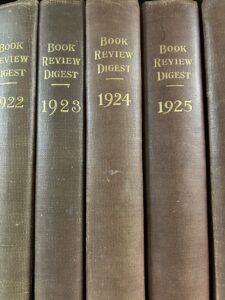 Our final find is from the Book Review Digest of 1924, featuring a review of H.G. Wells’ ‘The Dream.’ The review describes the story as a vehicle for Wells’ critique of modern civilization, with the barbarity and superstition of the World War era being likened to prehistoric times. It’s a poignant reminder that the critical examination of society and its conventions is as relevant today as it was a century ago.
Our final find is from the Book Review Digest of 1924, featuring a review of H.G. Wells’ ‘The Dream.’ The review describes the story as a vehicle for Wells’ critique of modern civilization, with the barbarity and superstition of the World War era being likened to prehistoric times. It’s a poignant reminder that the critical examination of society and its conventions is as relevant today as it was a century ago.